HVAC Companies Hatfield
Best HVAC Services in Hatfield
Get multiple HVAC Companies quotes for your project today! Compare profiles, reviews, accreditations, portfolio, etc... and choose the best offer.

Marvel Heating & Renewable Energy Ltd
4.562 reviewsUnit C, 3 Nelson Street, Doncaster, DN4 5AD, GBMarvel specialise in renewable energy and solar panels and was founded on the belief that clean and sustainable energy is the future for us all. We're here to make a difference, not only for you but for the planet we treasure. Every customer, regardless of size, matters to us. We take pride in our work, whether it's large-scale solar arrays on commercial farmland or single home battery installations. With meticulous system setups and unwavering customer care, we ensure maximum efficiency and a seamless experience from design to post-installation monitoring.
- Services
- Why Us?
- Gallery
Get Quote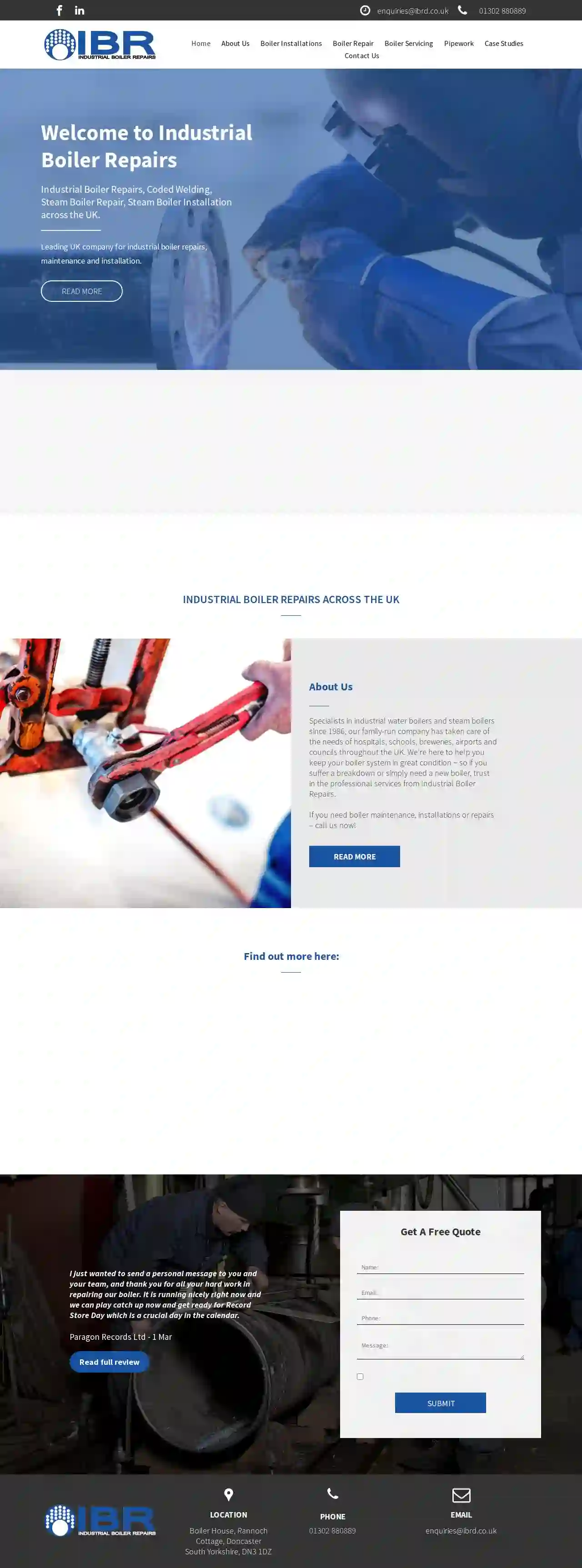
Industrial Boiler Repairs Doncaster
4.25 reviewsDoncaster, South Yorkshire, Rannoch Cottage, DN3 1DZ, GBWelcome to Industrial Boiler Repairs, a leading UK company for industrial boiler repairs, maintenance and installation. Established in 1986, our family-run company has taken care of the needs of hospitals, schools, breweries, airports and councils throughout the UK. We're here to help you keep your boiler system in great condition − so if you suffer a breakdown or simply need a new boiler, trust in the professional services from Industrial Boiler Repairs. Our expertly trained welders have extensive experience in the safe welding of pipework, boilers and pressurised systems and are SAFed and UKAS approved. We offer boiler repair, boiler maintenance, boiler installations, and coded welding pipework services across the UK.
- Services
- Why Us?
- Accreditations
- Testimonials
- Gallery
Get Quote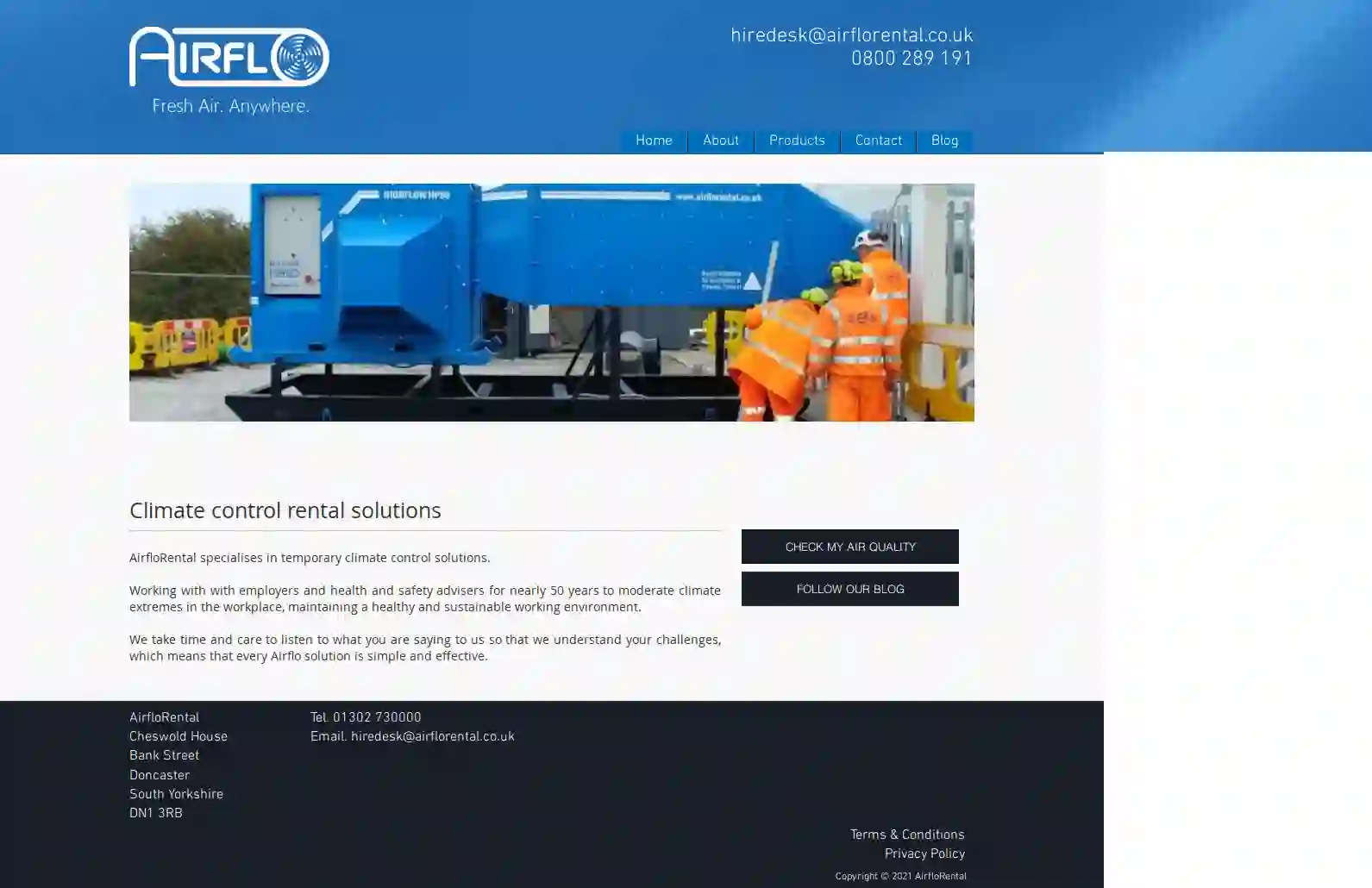
AirfloRental
54 reviewsBank Street, Cheswold House, Doncaster, DN1 3RB, GBAirfloRental specialises in temporary climate control solutions. Working with employers and health and safety advisers for nearly 50 years to moderate climate extremes in the workplace, maintaining a healthy and sustainable working environment. We take time and care to listen to what you are saying to us so that we understand your challenges, which means that every Airflo solution is simple and effective. AirfloRental Cheswold House Bank Street Doncaster South Yorkshire DN1 3RB Tel. 01302 730000 Email. [email protected]
- Services
- Why Us?
- Gallery
Get Quote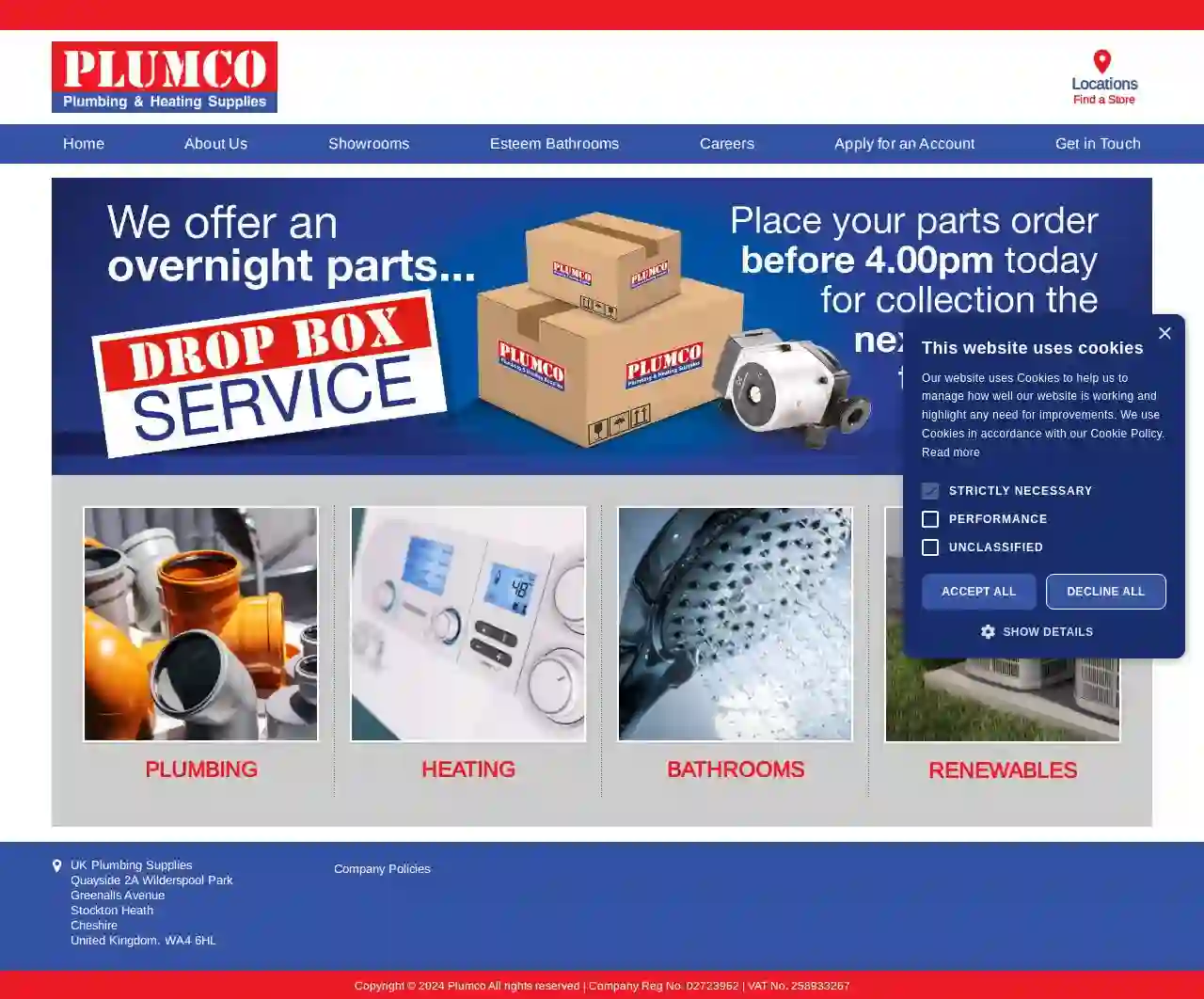
Plumco Doncaster
44 reviewsQuayside 2A Wilderspool Park, Greenalls Avenue, Stockton Heath, GBPlumco operates under a highly decentralised business model, allowing our experienced local teams to be the primary decision makers for our customers. Such a structure ensures that individual customer requirements are met with a first-class service. Our national infrastructure supports these efforts, enabling us to provide a consistent service throughout the UK. We are committed to maintaining extensive stock local to the customer's needs enabling us to offer the UK’s top brands ready for same-day delivery or collection. Our inventory also boasts a vast range of boiler spares, provided through our own central distribution, guaranteeing next-day availability for over 20,000 items. Whether you are a small or large customer, our aim is to provide you with the very best of service and ensure you come back time and time again. We are the largest independent plumbers' merchants in South Yorkshire. Founded in September 2000, Plumco have built a reputation based on excellent customer service, large stocks & competitive prices supplying both Trade & DIY customers. Our dedicated team have been providing a first class service to the local market for many years and have the resource of the wider UK Plumbing Supplies business for deliveries across the UK.
- Services
- Why Us?
- Gallery
Get Quote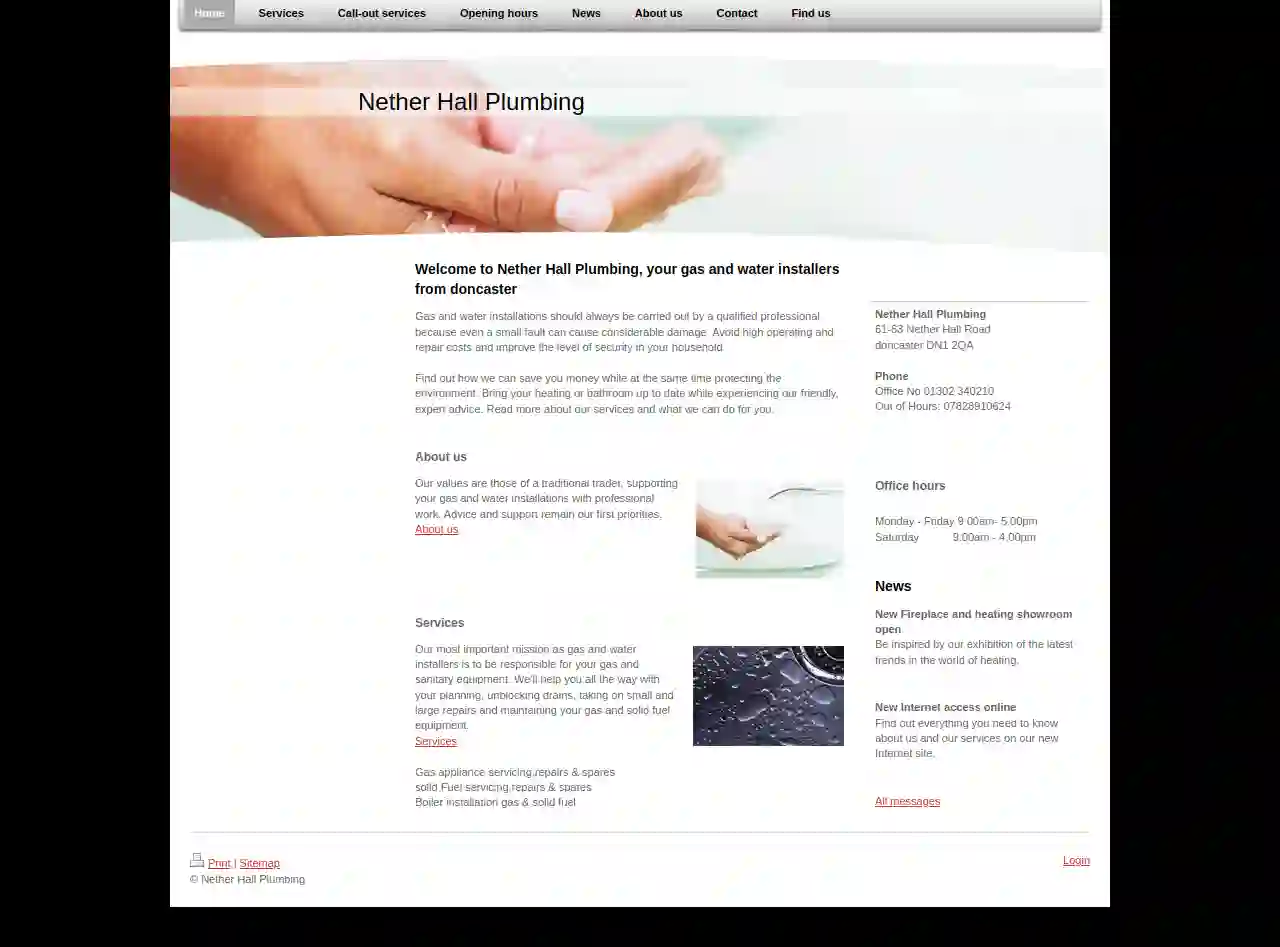
Netherhall Plumbing & Heating
11 reviews61-63 Nether Hall Road, Doncaster, DN1 2QA, GBWelcome to Nether Hall Plumbing, your gas and water installers from Doncaster. Gas and water installations should always be carried out by a qualified professional because even a small fault can cause considerable damage. Avoid high operating and repair costs and improve the level of security in your household. Find out how we can save you money while at the same time protecting the environment. Bring your heating or bathroom up to date while experiencing our friendly, expert advice. Read more about our services and what we can do for you.
- Services
- Why Us?
- Gallery
Get Quote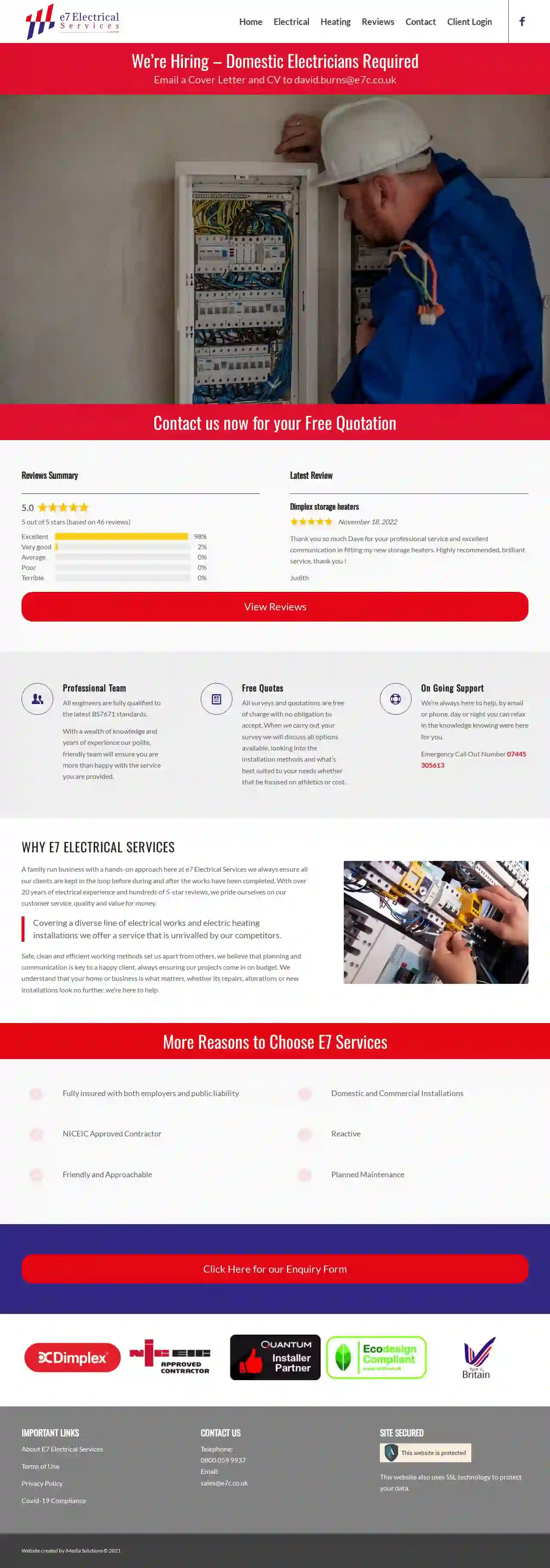
The Economy 7 Company
54 reviews1 Watervole Way, Apex Office Space, Doncaster, DN4 5JP, GBE7 Electrical Services is a family run business with over 20 years of electrical experience. We pride ourselves on our customer service, quality and value for money. We offer a wide range of electrical works and electric heating installations, and our team of fully qualified electricians are always happy to help. We understand that your home or business is what matters, whether it's repairs, alterations or new installations, we're here to help. Our approach is not your typical salesman approach, we pride ourselves on making sure your survey is carried out by a qualified electrician and not a salesperson on commission. We're fully insured with both employers and public liability, and we're NICEIC Approved Contractors. We're friendly and approachable, and we're always here to help, by email or phone, day or night. You can relax in the knowledge knowing we're here for you.
- Services
- Why Us?
- Accreditations
- Our Team
- Testimonials
- Gallery
Get Quote
Enigma Heating Solutions
568 reviews1 Arden Gate, Doncaster, DN4 9DW, GBNeed a local heating engineer you can trust? Enigma heating solutions has been helping our customers since 2016. Bringing over 25 years industry experience and with constant up to date training we offer the most affordable and professional service you'll find anywhere, beating any like for like quote on your new boiler, central heating installation or general plumbing requirements. Finance available! Get in Touch to Receive Your Free Quote.
- Services
- Why Us?
- Testimonials
- Gallery
Get Quote
Heating Yorkshire
54 reviews39 Langdale Way, Tickhill, DN11 9UX, GBHEATING YORKSHIRE Boiler Repairs & Installations Central Heating - Plumbing Services Heating Yorkshire Central Heating engineers & Plumbers Heating Yorkshire are experienced Gas Safe registered engineers offering over 15 years’ experience in the Plumbing and Heating sector. Specialists in boiler repairs and servicing and a workmanship that is quality assured and second to none. Based in the Doncaster and Rotherham areas. Call our Heat Team now to discuss your Central Heating or Plumbing needs on: 01302 752446 – 07792 239820 Get Your, No obligation Free Quote Today Contact Us Boiler Repairs – Plumbing – Bathroom Installations Central Heating Upgrades & Boiler InstallationsCondensing boiler packs Fully fitted from £1350 Boilers -10 year warranty* Central heating – 10 year warranty* Services Installation, Repair Service Landlord Certs, Power-flushes Radiators Plumbing Emergency response Gas Safe Register 545279 Heating Yorkshire Call Now For A Quote 01302 752446 – 07792 239820 [email protected] Affordable Prices – Guaranteed Call today and ask about our affordable, highly rated service. We wont be beaten price or service FREE No obligation Quotation Tell us a bit about how we can help.... Heating Yorkshire Customer Reviews See our 5 Star Reviews on Facebook Phil did a great job doing the work requested, he made every effort to keep the house clean and did all the work to a high standard. He couldn’t have been more helpful and I’ll happily recommend him to others and have him back if I need any future plumbing doing. Verified Review via CheckatradeCheckaTradeRating : 5 Phil diagnosed the fault and fixed it in approx an hour. Phil was friendly and efficient and I will use him again if required. Verified Review via CheckatradeCheckaTradeRating : 4I cannot emphasis how well this Guy did. I called him out to quote for a new boiler. Without asking he worked on my existing boiler and got it going for a day no charge. Weather was freezing he came within a week and replaced our boiler up and running. That’s service for you. Brilliant cannot speak any more highly of him. Verified Review via Checkatradevia CheckatradeRating : 5
- Services
- Why Us?
- Accreditations
- Our Team
- Testimonials
- Gallery
Get Quote
Project Heating Solutions
3.940 reviewsDoncaster, GBProject Heating Solutions is a UK-based company that specializes in providing cutting-edge heating technology to homes throughout the UK. With over 30 years of experience in the mechanical, electrical, and heating industries, our commitment to providing the best product and service before, during, and after an installation is second to none. We offer comprehensive renewable energy solutions to homes, including air source heat pumps, solar panels, batteries, and boilers. Our team of experts is dedicated to helping homeowners reduce their energy bills and carbon footprint while keeping their homes warm and cozy all year round.
- Services
- Why Us?
- Gallery
Get Quote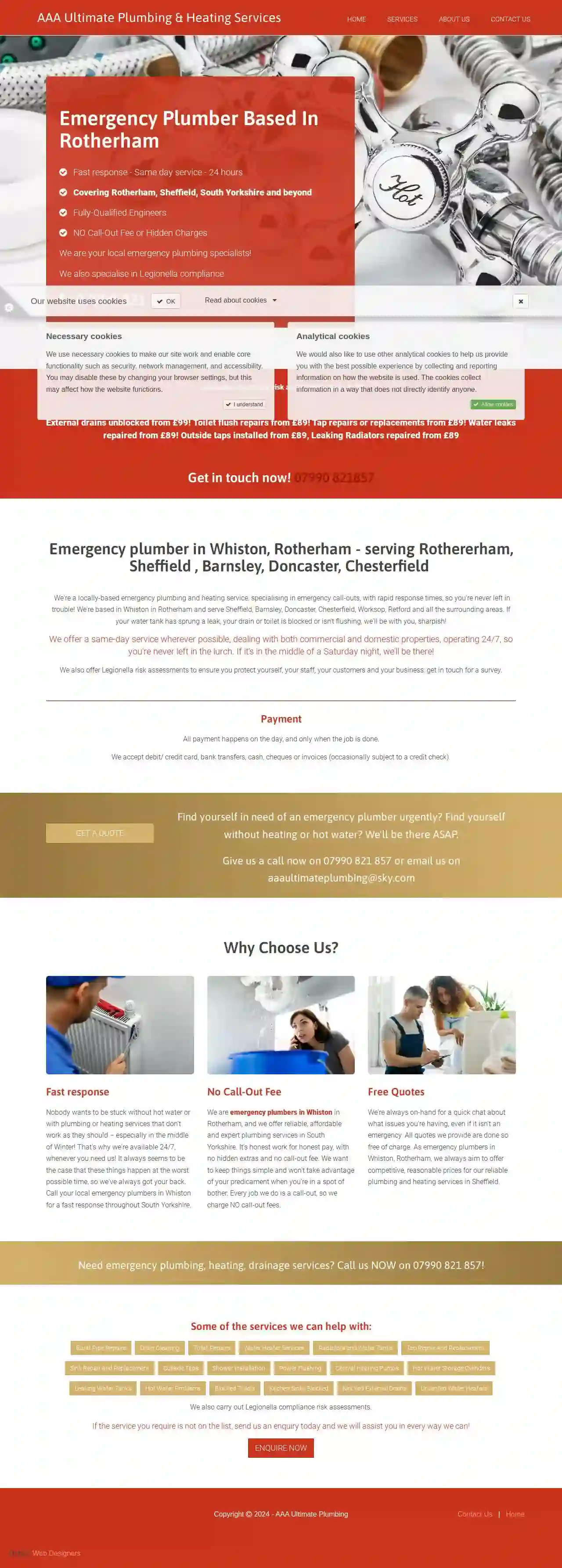
AAA Ultimate Plumbing & Heating
41 reviews17 Bent Lathes Avenue, Whiston, S60 4BL, GBAAA Ultimate Plumbing is a team of fully qualified plumbers based in Whiston, South Yorkshire, with over 20 years of combined experience in the trade. We are dedicated to providing reliable and affordable plumbing and heating services to both domestic and commercial properties throughout South Yorkshire. Our team of hard-working and well-trained engineers are passionate about resolving our customers' plumbing needs efficiently and effectively. We pride ourselves on our rapid response times, offering a 24/7 service with same-day appointments whenever possible. We cover a wide area including Sheffield, Rotherham, Barnsley, Doncaster, Chesterfield, Worksop, Retford and surrounding areas. We offer a mobile service and are always on call to assist with any plumbing emergencies. At AAA Ultimate Plumbing, we believe in transparent pricing with no hidden charges or call-out fees. We accept various payment methods, including debit/credit cards, bank transfers, cash, cheques, and invoices.
- Services
- Why Us?
- Gallery
Get Quote
Over 12,692+ HVAC Contractors onboarded
Our HVAC companies operate in Hatfield & beyond!
HVACCompaniesHub has curated and vetted the Best HVAC Businesses in Hatfield. Find the most reliable pro today.
Frequently Asked Questions About HVAC Companies
- Regular Air Filter Replacement: Change or clean your HVAC system’s air filters regularly (every 1-3 months).
- Professional Air Duct Cleaning: Have your air ducts cleaned by professionals every few years to eliminate dust, mold, and other contaminants.
- Improve Ventilation: Ensure adequate ventilation in your home to bring in fresh air and exhaust stale air. Use exhaust fans in kitchens and bathrooms.
- Control Humidity Levels: Use a humidifier or dehumidifier to maintain optimal humidity levels and prevent mold growth.
- Clean Regularly: Dust and vacuum frequently to minimize airborne particles.
- Avoid Smoking Indoors: Smoking indoors significantly reduces IAQ.
- Use Natural Cleaning Products: Opt for natural cleaning products that don’t release harmful VOCs (volatile organic compounds).
- Monitor Indoor Air Quality: Consider using an indoor air quality monitor to track pollutant levels.
- Regular Maintenance: Schedule annual HVAC maintenance to ensure your system is running at peak efficiency.
- Programmable Thermostat: Use a programmable or smart thermostat to optimize temperature settings based on your schedule.
- Seal Air Leaks: Caulk and weatherstrip windows and doors to prevent drafts.
- Proper Insulation: Ensure adequate insulation in your attic, walls, and floors to prevent heat loss in winter and heat gain in summer.
- Ventilation: Use fans strategically to circulate air and reduce reliance on AC.
- Energy-Efficient Appliances: Choose energy-efficient appliances to reduce your overall energy load.
- HVAC Zoning: Consider zoning your HVAC system to condition different areas of your home separately.
- Check Online Reviews: Look for HVAC companies with positive reviews and high ratings on platforms like Google, Yelp, and others.
- Ask for Referrals: Reach out to friends, family, neighbors, or colleagues for recommendations.
- Verify Licensing and Insurance: Ensure the company is properly licensed and insured to operate in your area.
- Look for Certifications: Check for certifications from reputable organizations like NATE (North American Technician Excellence).
- Compare Quotes: Get quotes from multiple HVAC companies to compare pricing and services.
- Use a Directory like HVACCompaniesHub: Simplify your search by using our directory of pre-screened and qualified HVAC professionals.
- AC not cooling: Refrigerant leaks, compressor issues, or thermostat problems.
- Furnace not heating: Pilot light or ignition control issues, blower motor problems, or clogged filters.
- Uneven temperatures: Ductwork leaks, inadequate insulation, or faulty thermostats.
- Poor air quality: Dirty air filters, mold growth in ductwork, or inadequate ventilation.
- Strange noises: Unusual sounds from the system can indicate a variety of problems with different components.
- High energy bills: Inefficient systems, ductwork leaks, or improper thermostat settings.
How can I improve my home's indoor air quality?
How can I reduce my HVAC energy consumption?
How do I find a good HVAC company near me?
Finding a reputable HVAC company requires research. Consider these tips:
What are the most common HVAC problems?
Common HVAC problems include:
How can I improve my home's indoor air quality?
- Regular Air Filter Replacement: Change or clean your HVAC system’s air filters regularly (every 1-3 months).
- Professional Air Duct Cleaning: Have your air ducts cleaned by professionals every few years to eliminate dust, mold, and other contaminants.
- Improve Ventilation: Ensure adequate ventilation in your home to bring in fresh air and exhaust stale air. Use exhaust fans in kitchens and bathrooms.
- Control Humidity Levels: Use a humidifier or dehumidifier to maintain optimal humidity levels and prevent mold growth.
- Clean Regularly: Dust and vacuum frequently to minimize airborne particles.
- Avoid Smoking Indoors: Smoking indoors significantly reduces IAQ.
- Use Natural Cleaning Products: Opt for natural cleaning products that don’t release harmful VOCs (volatile organic compounds).
- Monitor Indoor Air Quality: Consider using an indoor air quality monitor to track pollutant levels.
How can I reduce my HVAC energy consumption?
- Regular Maintenance: Schedule annual HVAC maintenance to ensure your system is running at peak efficiency.
- Programmable Thermostat: Use a programmable or smart thermostat to optimize temperature settings based on your schedule.
- Seal Air Leaks: Caulk and weatherstrip windows and doors to prevent drafts.
- Proper Insulation: Ensure adequate insulation in your attic, walls, and floors to prevent heat loss in winter and heat gain in summer.
- Ventilation: Use fans strategically to circulate air and reduce reliance on AC.
- Energy-Efficient Appliances: Choose energy-efficient appliances to reduce your overall energy load.
- HVAC Zoning: Consider zoning your HVAC system to condition different areas of your home separately.
How do I find a good HVAC company near me?
Finding a reputable HVAC company requires research. Consider these tips:
- Check Online Reviews: Look for HVAC companies with positive reviews and high ratings on platforms like Google, Yelp, and others.
- Ask for Referrals: Reach out to friends, family, neighbors, or colleagues for recommendations.
- Verify Licensing and Insurance: Ensure the company is properly licensed and insured to operate in your area.
- Look for Certifications: Check for certifications from reputable organizations like NATE (North American Technician Excellence).
- Compare Quotes: Get quotes from multiple HVAC companies to compare pricing and services.
- Use a Directory like HVACCompaniesHub: Simplify your search by using our directory of pre-screened and qualified HVAC professionals.
What are the most common HVAC problems?
Common HVAC problems include:
- AC not cooling: Refrigerant leaks, compressor issues, or thermostat problems.
- Furnace not heating: Pilot light or ignition control issues, blower motor problems, or clogged filters.
- Uneven temperatures: Ductwork leaks, inadequate insulation, or faulty thermostats.
- Poor air quality: Dirty air filters, mold growth in ductwork, or inadequate ventilation.
- Strange noises: Unusual sounds from the system can indicate a variety of problems with different components.
- High energy bills: Inefficient systems, ductwork leaks, or improper thermostat settings.